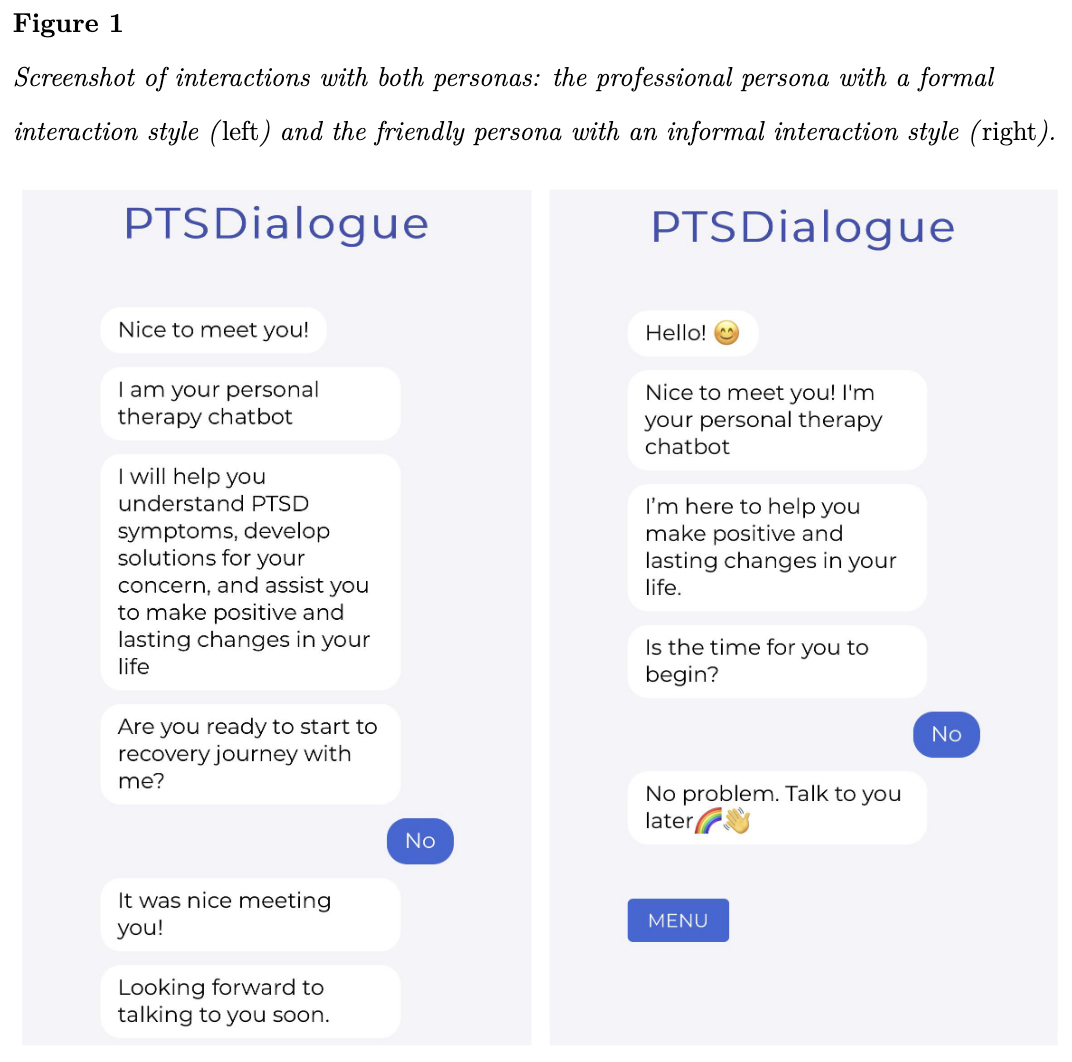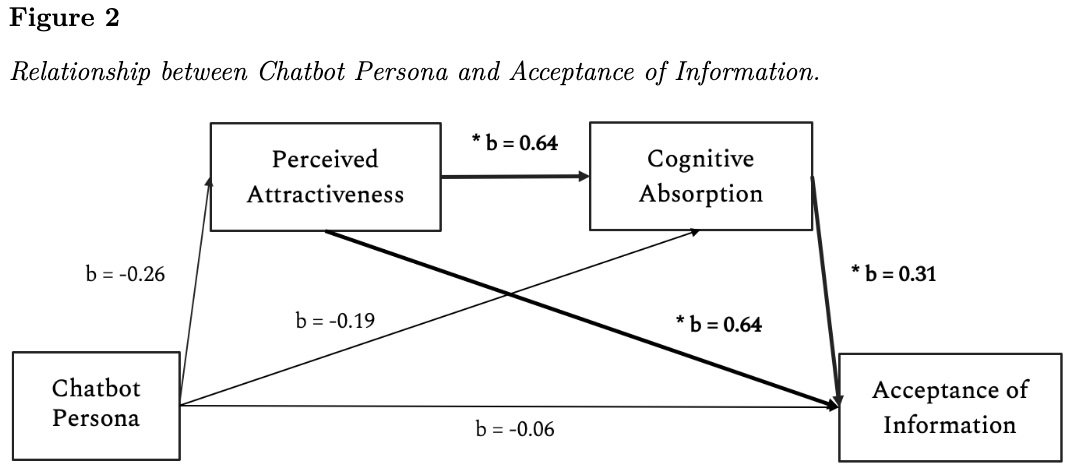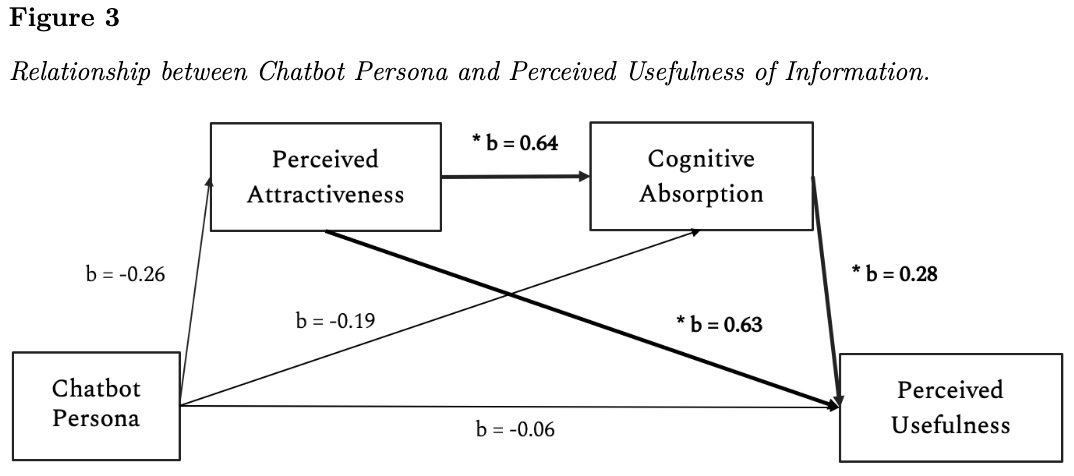Media Effects Research Lab - Research Archive
“Hi!” VS. “Hello”: The Impact of Persona on Users' Acceptance of a Psychoeducational Chatbot
Student Researcher(s)
Hee Jeong Han (Ph.D Candidate);
Sanjana Mendu (Ph.D Candidate);
Faculty Supervisor
This paper was based on a project as part of the “COMM 506: Research Methods in Communications” course.
INTRODUCTION
Post-traumatic stress disorder (PTSD) is a serious public health issue, with approximately 8 million adults in the United States suffer from PTSD in any given year. Current approaches to support persons living with PTSD are often unable to sustain adherence, leading to sub-optimal clinical outcomes. Chatbots can help to improve longitudinal adherence by interactively engaging users and maintaining social presence. This study aims to investigate how perceived chatbot persona affects cognitive absorption of psychoeducation material and how cognitive absorption affects individual's acceptance of health information from a chatbot.
RESEARCH QUESTION / HYPOTHESES
RQ1: For adults, controlling for gender, race, age, and education level, what is the relationship between perceived differences of chatbot personas and cognitive absorption of psychoeducation material?
RQ2: For adults, controlling for gender, race, age, and education level, what is the relationship between cognitive absorption of psychoeducation material and individuals' acceptance and perceived usefulness of health information from a chatbot?
H1: Professional persona will be positively associated with attractiveness toward the persona.
H2: High attractiveness toward the persona will be positively associated with cognitive absorption during exploring the chatbot.
H3a: High cognitive absorption through the chatbot will be positively associated with acceptance of information offered by the persona.
H3b: High cognitive absorption through the chatbot will be positively associated with perceived usefulness of information offered by the persona.
METHOD

The researchers conducted a 2 (persona: professional vs. friendly) condition between-subjects experiment to assess how perception of persona affects user’s information acceptances. Participants (N=118) were randomly assigned to one of two stimuli in which they were asked to interact with a chatbot whose persona was presented and constructed as either “professional” or a “friendly”. Following the interaction, participants’ attitudes toward the chatbot were measured, including perceived attractiveness, cognitive absorption, and acceptance and perceived usefulness of information provided by the chatbot.
RESULTS
H1 was not supported by the ANOVA or mediation analyses. This suggests that our personas were not perceived as we had hoped and instead presented significant overlap. Our manipulation of chatbot persona did not have a significant effect of the mediating variables. Although an ANOVA test showed that acceptance of information was slightly higher in the ``professional'' persona condition [F(1, 116) = 3.96, p = 0.048], a subsequent mediation analysis did not support this supposed direct effect.
H2 was supported by both the ANOVA and mediation analyses conducted. This suggests that participants' perception of the chatbot's attractiveness influence their cognitive absorption while interacting with the chatbot. H3a and H3b were also supported, highlighting the importance of cognitive absorption in supporting participants' acceptance and perceived usefulness of the information provided by the chatbot. Interestingly, perceived attractiveness also had a direct effect on acceptance and perceived usefulness of information. This challenges the assumption of serial mediation made by adopting PROCESS model 6 for the mediation analysis.


CONCLUSIONS/DISCUSSION
Multiple regressions and mediation analyses were conducted on online survey responses, controlling for gender, age, education level, and race. Results revealed that perceived differences, rather than actual differences, in chatbot persona significantly influence user outcomes following a psychoeducational interaction.
For more details regarding the study contact
Dr. S. Shyam Sundar by e-mail at sss12@psu.edu or by telephone at (814) 865-2173

